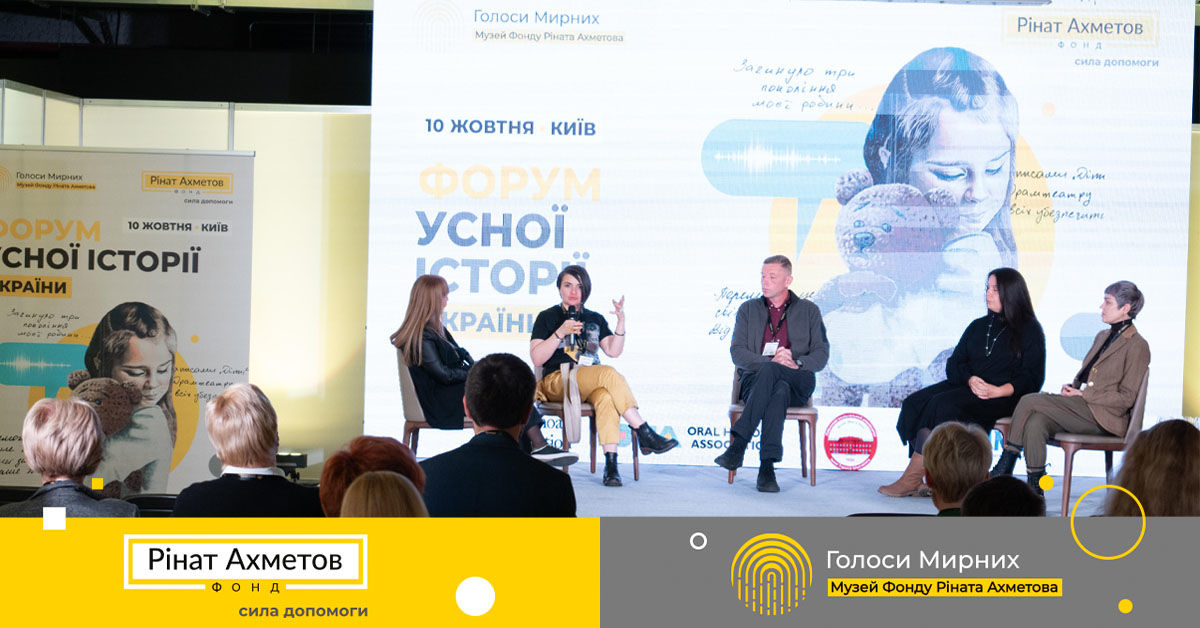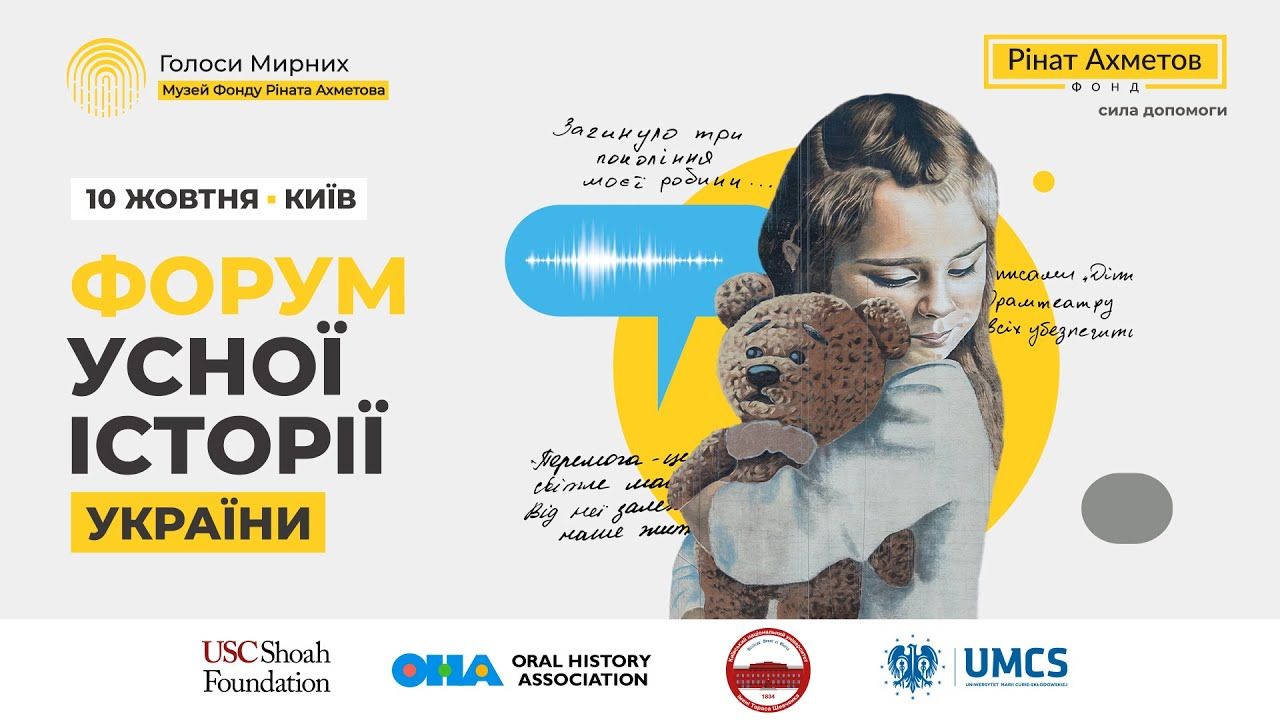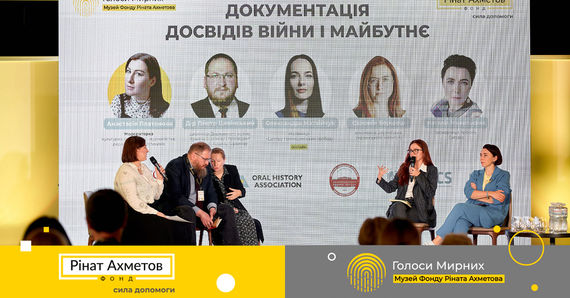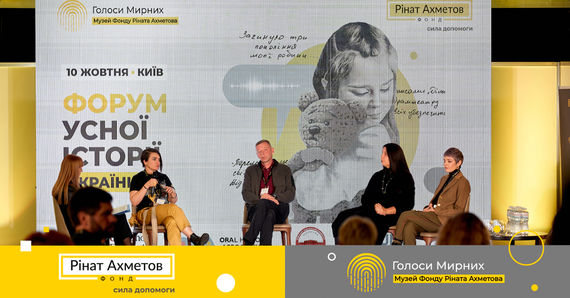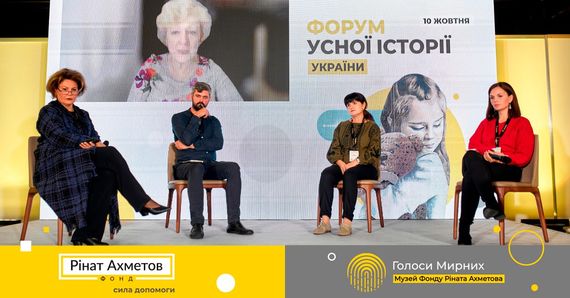The Forum of Oral History of Ukraine, the long-awaited first offline meeting of Ukrainian and international documentation initiatives, took place in Kyiv
The Forum was organized by the Museum of Civilian Voices of the Rinat Akhmetov Foundation. The event consisted of three discussion panels about various aspects of documenting war experiences, as well as special speeches from keynote speakers.
The Forum, which was held in partnership with the USC Shoah Foundation and the Oral History Association, the Taras Shevchenko National University, and the Marie Curie-Sklódowska University (Lublin), sparked great interest even before it began.
The event lasted almost the whole day on October 10 and was attended by about 200 guests. Among them were scientists-historians, experts, and students of universities of Ukraine and Europe, as well as war correspondents and documentarians, representatives of public organizations, institutions dealing with war experiences, lawyers, human rights defenders, etc.
The participants of the Forum were greeted by the partners of the event: Professor Volodymyr Bugrov, rector of the Taras Shevchenko National University of Kyiv, and Professor Valentin Balyuk, director of the Eastern Europe Center of the Maria Curie-Sklodowska University in Lublin.
Natalia Yemchenko – Chief Reputation Officer at SCM, member of the supervisory board of the Rinat Akhmetov Foundation, member of the supervisory boards of Mariupol. Reborn and "Heart of Azovstal" projects – thanked all guests, speakers, and participants who joined the Forum online and offline.
"The documentation initiatives that are currently active in Ukraine, are, on the one hand, a response to the terrible events of a full-scale war, and on the other, an extremely significant factor in realizing who we are and filling in the white spots. We are honored to contribute to this cause. After all, without the ability to remember, we will live in other people's myths and narratives. This is the occupation of memory and history, the same as the occupation of our territory."
Natalia also noted that among the main goals of the Forum were the following: to discuss the key pain points in the development of the field of documentation of war experiences and to develop and deepen existing connections between professionals and institutions currently working in this field.
During the first panel discussion "When experiences become knowledge", the participants raised questions of research ethics and methodological approaches. After all, oral history is only one of the methods of documenting war experiences; other methods are no less important. The participants also discussed different approaches to documentation used by representatives of documentation initiatives with different backgrounds: academic, journalistic, human rights, and artistic.
The second panel discussion on the topic "Oral history: tasks, roles, problems" discussed the key challenges currently faced by practitioners in the field of documentation of war experiences. In particular, it was about the experience of overcoming emotional burnout, post-traumatic complications, and compliance with ethical standards in documentation.
The third panel discussion - "Documentation of war experiences and the future" - was about the importance of documented war experiences for the future: from achieving post-war justice to the advocacy of Ukraine at the international level.
The keynote speaker of the Forum, Anton Liagusha, candidate of historical sciences and public history researcher, academic director of master's social and humanitarian studies at the Kyiv School of Economics, gave a speech on the topic "War Documentation Strategies: Authority, Power, Content, and Testimony". He noted that discussing the issue of the fixation of the war from both a theoretical and a practical point of view is an extremely important opportunity now.
"In my opinion, Russia not only kills people but also privatizes the voice of the dead. We, unlike Russians, want to hear the voices of those who survived.
Preservation of history, unfortunately, does not make it impossible to repeat it, there are enough examples of this. But it is obvious that when we forget our own history, it is built by others. This is what Russia has been trying to do with Ukraine for centuries.
When we talk about war documentation, we are primarily talking about:
- establishing responsibility. In this case, documents are created according to professional standards. They will then serve as evidence in an international court;
- creating narratives. There are many risks in this area and one must be honest and as critical as possible;
- importance for the military, as it allows them to track enemy tactics and strategies;
- preserving the memory of victims and heroes".
Anton Drobovych, head of the Ukrainian Institute of National Memory, one of the speakers of the first discussion panel, noted:
"Memory is always subjective, emotional, selective, unreliable. It is never completely objective. And the methods by which we work with memory, selecting these or other evidences, are aimed at minimizing these manifestations. But the larger the array of memories, the greater the claim to objectivity. Therefore, I am very glad that the Forum is starting the conversation with the presentation of a study on the state of oral history in Ukraine."
The keynote speaker Stephen Sloan, executive director of the Oral History Association (OHA), doctor, historian, and professor at the Baylor University in Texas, spoke about the problems faced by specialists of the Association, which investigates crisis situations during disasters in various countries.
"We investigated crises in Egypt, China, Malaysia, Italy, Thailand, etc. Our motivation is, firstly, the desire to document the history of unfolding crises in real time. And secondly, we are talking about humanitarian response, we want to understand and hear people in times of crisis.
A crisis always reveals many interesting elements that were hidden before it - gender, class, religion, etc.
For oral historians, standing next to those who are going through trials is a difficult task, because vicarious trauma (the secondary trauma of the listener) can be difficult to avoid. On the other hand, people who have been able to tell their story out loud often feel better".
The special guest of the Forum, the speaker of the panel discussion "Documentation of war experiences and the future", Dr. Piotr M.A. Cywinski, a historian, public figure, Director of the Auschwitz-Birkenau State Museum and president of the Auschwitz-Birkenau Foundation (Poland), admitted that he did not know any military conflict that would be so well and vividly demonstrated outside the country.
"Ukrainians have at least 5-7 million mobile phones. Many have hundreds of photographs from the scene of the war. Each photo has metadata. If it were possible to create a single platform to which people would send their photos, it would be a unique shared archive.
I think the next stages of this documentation will be very important. After all, after the stage of informing, the stage of court proceedings begins. On the basis of these testimonies, prosecutors will very easily be able to find people who will act as witnesses. Then the so-called historical stage will come, and there will be an enormous amount of valuable material for historians."
The Forum is an initiative of the Museum of Civilian Voices of the Rinat Akhmetov Foundation, which has been documenting first-person testimonies of civilians about the war for more than five years and has already collected more than 85,000 testimonies.
The Forum of Oral History of Ukraine raised many important questions and topics worthy of discussion. Follow the news about the event on the website of the Museum of Civilian Voices https://civilvoicesmuseum.org/en/news
